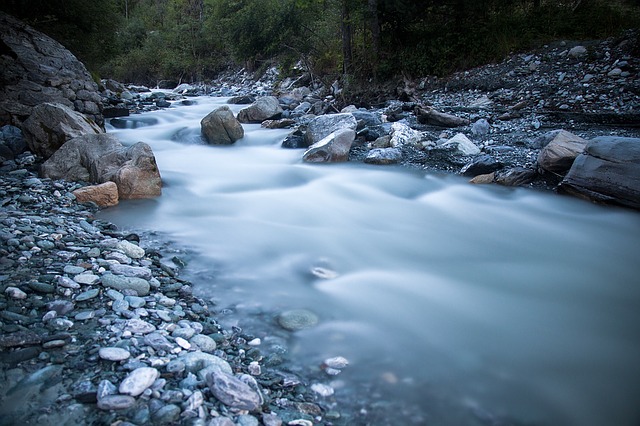Upstream Traffic Towards Paris – Confusing Directions In French Posted by John Bauer on Aug 23, 2019 in Uncategorized
Learning le français is all about making mistakes and being at a loss for words when there’s something important to say. That can lead to some embarrassing moments, but a few uncomfortable seconds is the price to pay for free French lessons.
Being a non-native francophone (French speaker), I often hear a new word before I know how to write it or what it means. Bien sûr (of course), I have a vague idea of how to use it, but I would never be able to clearly define or spell it.
A few years ago on this blog, I told a story about hearing a word without seeing it and the confusion it can cause with Dansequâ:
I was reminded of a similar lesson when a pair of relatively common mots français (French words) recently came up. I had learned and generally understood them, but would never be able to correctly define them:
En amont – Upstream
En aval – Downstream
After mixing the two words up a few too many times, I finally looked them up, but their definitions never really felt complete. I knew en amont et en aval were used well outside of the context of le flux d’une rivière (the flow of a river).
I was reminded of that confusion one morning while listening to la radio when a traffic report came on. While describing an accident on a major highway, l’animateur (the host) specified in which direction traffic was backed up:
Un bouchon s’est constitué en amont de Paris.
A traffic jam built up upstream of Paris.
For the life of me I couldn’t figure out which direction that meant and muttered to myself:
Ça veut dire vers où exactement ?!
That means towards where exatly?!
So I decided to clear things up once and for all. It was time to really learn all there is to know about the tricky pair that is en amont et en aval.
En amont does mean upstream, but how it’s used in everyday life is more complicated. Le mot français has taken on a metaphorical sense that doesn’t exist in English. En amont outside of les cours d’eau (waterways) can mean before or in advance.
En amont – Before, in advance
That means en français you can prepare for something en amont or work on a project en amont. La métaphore (the metaphor) can be extended to general directions, meaning being stuck somewhere en amont de a location that’s not connected to the flow of a river!
En amont de – Behind
Pour un anglophone (for an English speaker) like myself, it took a stretch of the imagination to understand how upstream from the source of a river could mean behind. The lack of an equivalent English expression made wrapping my head around the idea extremely difficult.
With a little patience it started to make sense and I could see how the relative nature of moving towards the source can mean somewhere before the origin. After realizing that, the early morning traffic report started to make more sense:
Un bouchon s’est constitué en amont de Paris.
A traffic jam built up in the direction of Paris.
En aval works in much the same way with the literal definition being downstream, but having taken on a broader metaphorical sense of after. In my personal experience I’ve noticed the more abstract use of en aval (after) is more common for projects and refers to things that can be done after a project is completed.
While it might seem odd to be familiar with a word without being able to know how a concise definition. In writing cet article (this article), I experienced the very same thing with un mot anglais (an English word)!
While trying to figure out how une rivière flows and which direction exactly is upstream and downstream, I saw that the mouth of a river is called l’embouchure.
Une embouchure – A mouth of a river
That may not jump out to every reader, but as someone who played a wind instrument, I can clearly remember le prof (the teacher) saying how important it is to maintain your embouchure when blowing into the instrument.
I never knew how to spell the musical word and never thought that it was actually un mot français (a French word)!
Learning from context is a great way to pick up vocabulary and is the best way to keep conversations flowing like a river. Cependant (however), sometimes nothing beats taking the time to look things up and figuring out exactly what a new word means.

Build vocabulary, practice pronunciation, and more with Transparent Language Online. Available anytime, anywhere, on any device.




